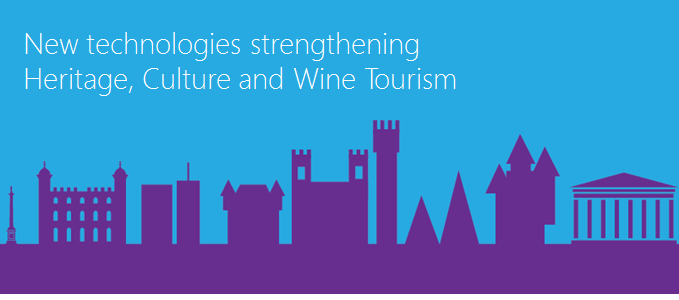Culture and technology are new allies. By working together, technology breaks down barriers of distance encouraging European cultural cooperation boosting tourism and stimulating local economies.
An innovative partnership between Microsoft and a joint programme developed by the Council of Europe and the European Commission has been showcasing a new way of empowering the cultural economy and promoting European heritage through technology. European Heritage Days (EHDs) is the biggest participatory cultural initiative shared by the citizens of Europe Each September EHDs attract up to 20 million visitors, generating the greatest promotional and economic value of all European Heritage projects.
Using Microsoft’s Bing Maps technology, an extremely informative portal has made this flagship initiative more accessible than ever for both event organisers and visitors. This portal allows visitors to take a virtual journey to all events organised in the framework of the EHDs, helping tourists to plan their cultural activities by providing a one-stop-shop for all venues and attractions.
“Digitisation and the effective use of IT across the Culture and Heritage sectors are increasingly important to enable democratic access and engagement.”
It has also introduced sweeping changes into the process of online management and promotion of EHDs events. Previously, national EHDs coordinators had to rely on local websites to leverage access activities organised in their countries. The revamped EHDs site offers them the first truly collaborative platform to reach out to European audiences in other countries and work with fellow coordinators on common themes and strategies. National coordinators can now upload and update their content as well as grant access to the content management system to local coordinators. They have also got a new tool for engaging culture vultures from across Europe in conversations and picture sharing to create positive stories around their events.
This dynamic portal embodies a new, democratic cultural platform, through which local communities will benefit from the same visibility and access to exchange as well-known urban heritage sites currently enjoy. Claudia Luciani, Director of Democratic Governance at the Council of Europe, emphasised: “Digitisation and the effective use of IT across the Culture and Heritage sectors are increasingly important to enable democratic access and engagement”. The goal is to give equal visibility to all the treasures of European heritage and culture, regardless of their size, resources or location.
“Technology is a great enabler across all sectors of the economy. The European cultural and creative sectors already represent up to 4.5% of European GDP and account for some 3.8% of the EU workforce (8.5 million people).”
This successful collaboration has inspired a debate on the best way of advancing the vision of further synergies between technology providers and key European institutions working in the culture and heritage sectors. Luciani stated that the Council of Europe welcomes the role that Microsoft has played in driving “an exchange of view on these questions between leaders of Culture, Heritage and Digitisation Programmes Which has The Association for Culture and Tourism Exchange (ACTE) is another organisation which has engaged in a dynamic partnership between technology and culture. This international NGO worked with Microsoft on a project that supports the European dimension of wine culture by setting out the first comprehensive map of European wine routes. The Wine Community Platform uses Bing Maps to offer wine communities privileged access to cultural and commercial exchanges, giving them a competitive edge on local and international markets. In addition, by using Microsoft´s ¨cloud¨ services, the platform benefits from greater scalability and performance that will deliver the best possible user experience, while reducing implementation and operational costs.
“This collaboration with the Council of Europe and the ACTE has offered a unique opportunity for Microsoft to impact the life of Europeans and millions of people from around the world looking for a taste of Europe.”
Technology is a great enabler across all sectors of the economy. The European cultural and creative sectors already represent up to 4.5% of European GDP and account for some 3.8% of the EU workforce (8.5 million people). By collaborating with the Council of Europe and ACTE we hope to help this vital sector of the economy reap the benefits of digital technology. This is part of our longstanding commitment to help Europe, its citizens and its businesses thrive. Through our devices and services, SME ecosystem, R&D centers and corporate initiatives, we are dedicated to accelerating innovation, creating opportunities and providing solutions to societal challenges across the continent.
These collaborations have proved that technology can foster cross-frontier links between cultural projects and facilitate new partnerships between European culture managers and entrepreneurs. More importantly though, Microsoft is proud that our technology is contributing to business and tourism in local communities that previously lacked the tools to reach potential visitors and customers. By using Bing Maps and leveraging the creative muscle of Microsoft Gold Partner, Geeks, we have helped to provide all Europeans with an equal opportunity to put their local heritage on the digital cultural map.
“This collaboration with the Council of Europe and ACTE has offered a unique opportunity for Microsoft to impact the life of Europeans and millions of people from around the world looking for a taste of Europe”, concluded Stephen Collins, Microsoft Vice President for Corporate Affairs.




